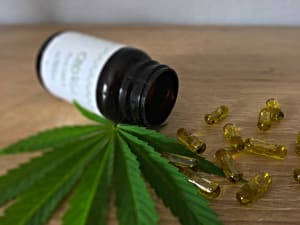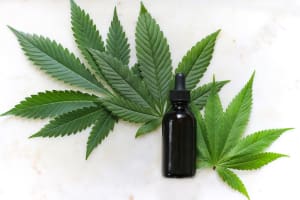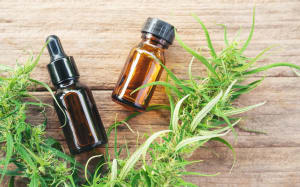We’re all familiar with the stereotypical “stoner,” that heavy user of marijuana who is more often than not hungry, spaced-out, and…sleepy? But does marijuana affect your sleep?
There is no doubt that smoking marijuana has intense psychological and physical effects on its users. But how exactly does using marijuana affect our sleep quality and what are the effects on sleep?
With the easing of laws surrounding the illegality of medical marijuana and even recreational marijuana use across the country, there is a renewed interest in the substance as a possibly important piece in the wellness puzzle. Claims that marijuana, and especially CBD (a specific psychoactive ingredient found in the marijuana plant) can aid in maintaining healthy sleep patterns have popped up across the web, as well as in marketing materials for the numerous companies making products which supposedly offer a myriad of health benefits.
Considering that over 1 in 3 Americans reportedly use traditional over-the-counter (OTC) sleep aids and that a whopping sixty-percent of them reported having serious side-effects the next day, a natural alternative like cannabis could be a game-changer if it is as safe and effective as some claim.
Before you rush out to become a cannabis user to help you catch some Zs, it’s important to understand how exactly this substance is related to sleep.

How Does Cannabis Affect the Brain?
Before digging into the relationships between cannabis and sleep, it’s helpful to know a little background on the general affects the drug can have on users.
Marijuana is a plant that can be smoked, inhaled, or ingested to activate its active ingredients. The plant itself can also be processed into a number of products that isolate certain chemicals of its composition. There are hundreds of chemicals in cannabis, referred to as cannabinoids, but the two most well-researched chemicals are tetrahydrocannabinol, commonly known as THC, and cannabidiol, commonly known as CBD. While it is important to note that cannabis seems to affect every person slightly differently, researchers have noted the following qualities of each compound.
- THC: This ingredient is the one most responsible for the classic “high” feeling people often refer to. It works by stimulating the release of dopamine, generally resulting in euphoria and feelings of deep relaxation.
- CBD: CBD is the second most prevalent psychoactive ingredient in cannabis. It does not seem to induce the same “high” feeling as THC, but has been linked to a number of therapeutic uses including chronic pain management, seizure prevention, and more.
Cannabis comes in a variety of strains, or slightly different varieties, each containing differing amounts of each psychoactive ingredient. Some strains have been anecdotally reported to be better for sleeping than others. The Growth Op, a cannabis news and trends website, suggests asking your “budtender” (an operator of a legal cannabis dispensary) for help in choosing a strain that will be right for you.

THC and Sleep
The research on THC and sleep is decidedly mixed. A review of the scientific literature, conducted in 2017, concluded that the current body of research indicated THC has a “short term sleep benefit.” Studies showed that THC might help to treat sleep apnea, prevent nightmares in patients with PTSD, and shorten the amount of time it takes to fall asleep.
However, that same paper found that over the long term, the use of THC to sleep could interfere with circadian rhythm, and create “delayed sleep onset latency,” or lengthen the amount of time it took to fall asleep. The paper generally concluded that THC was most effective as a general sleep aid when used at a relatively low dose, for a short period of time.
Interestingly, preliminary research shows that synthetic THC, or versions of the chemical made in a lab as opposed to being derived from the cannabis plant, shows promise as a sleep aid. Further research on that subject will certainly have important results.
CBD and Sleep
CBD on the other hand, seems to have a much stronger reputation as a sleep aid.
In the 2017 review, CBD appeared to offer different results based on the dose it was administered in. At very low doses, CBD was shown to be simulating, while at medium and high doses the drug was sedating. These higher doses were associated with increased sleep time (longer sleep) and improve sleep. CBD was also found to reduce insomnia and sleep-related symptoms of PTSD when administered in higher doses.
Another scientific review of cannabis and sleep found CBD could “hold promise” for treatment of REM sleep behavior disorder, a strange occurrence where sleepers act out their dreams.
CBD has also been found to aid in pain relief and as a treatment for anxiety, two conditions that may make it difficult to sleep.
All of this research, combined with a litany of claims about other uses for CBD, has led to an explosion of CBD products in the last few years, some of them marketing specifically as sleep aids.

Should I Try Marijuana for Sleep?
The bottom line on how marijuana affects your sleep is this: while some forms of the drug have proven helpful in helping people at bedtime, marijuana affects everybody differently, and it is certainly no silver bullet. In fact, some users may find that taking cannabis or cannabis products makes sleeping well more difficult and choose to continue natural sleep.
If you are interested in trying cannabis or edibles for use as a sleep aid, you might want to consider taking the following actions.
- Talk to your doctor: before trying any new medication, speak with your physician about risks and potential benefits.
- Make sure to obey all laws and regulations: Cannabis and its component chemical compounds have varying legal statuses across the United States. Make sure to purchase your products from licensed vendors.
- Speak with dispensary operators about a product for you: employees and operators of cannabis dispensaries can help you navigate the sometimes overwhelming selection of products to ensure you are receiving the best one for your needs.
- Use cannabis in conjunction with other healthy sleep routines: getting a proper amount of exercise, maintaining a healthy diet, and avoiding excessive alcohol and nicotine will increase the chance that you get a good night’s sleep, with or without the help of cannabis.
- Additional Tips: Read our article on 8 Tips for a Better Night’s Sleep
Has marijuana affected your sleep? let us know!